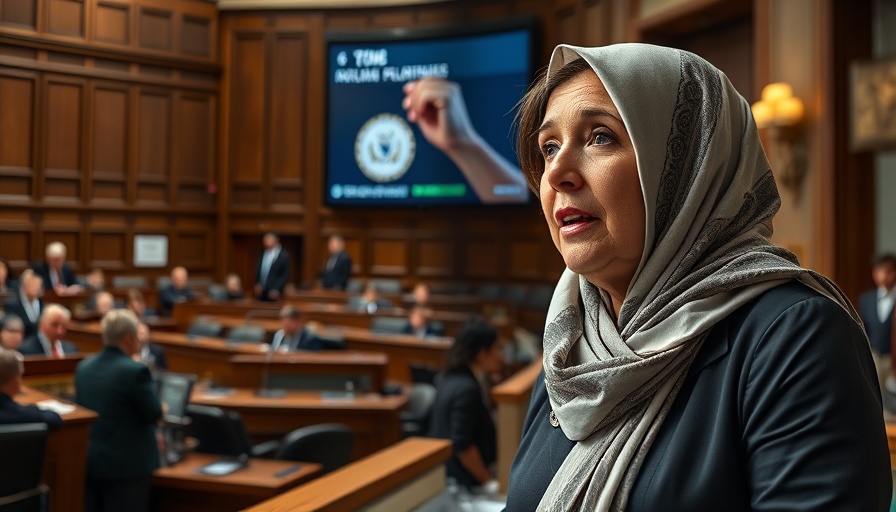
The Censure That Almost Happened: A Look at House Resolution 713
The recent resolution to censure Representative Ilhan Omar over her comments following the tragic assassination of Charlie Kirk on September 10, 2025, has stirred significant controversy in the halls of Congress. The resolution, which sought to publicly reprimand Omar for her statements and actions surrounding Kirk's death, ultimately failed to pass. This incident illustrates ongoing tensions in American political discourse, especially regarding themes of freedom of speech and accountability.
In BREAKING NEWS: House Attempt To Censure Ilhan Omar Over Post-Charlie Kirk Killing Comments Fails, the discussion centers on criminal accountability in political discourse, which has led us to a deeper examination of these significant issues.
Understanding the Context: Who Was Charlie Kirk?
Charlie Kirk was a prominent figure in conservative circles, known for his advocacy for freedom of speech and youth engagement in politics. His assassination while speaking at Utah Valley University sparked outrage among his supporters, leading to calls for reactions from various political figures, including Rep. Ilhan Omar. Kirk was described as a man of deep faith, a devoted husband, and father, and his untimely death raised profound questions about the state of political rhetoric in America.
The Content of the Controversy: Omar's Statements Explained
Omar's remarks following Kirk's death, including a disparaging video she shared on social media, claimed that he was partly to blame for his own murder based on his political views and activism. This sparked a backlash, leading to a formal censure motion against her. The elements of the proposed resolution pointed out how her comments were perceived as undermining not only Kirk's legacy but also the decorum expected from a member of Congress. Many critics argued that Omar's actions were disrespectful and damaging to the integrity of House proceedings.
Political Ramifications: What Does This Mean for Congress?
The failure of Resolution 713 to pass is indicative of the polarized political environment in the U.S. today. With a tight vote tally—214 for and 213 against—the result highlighted the thin margins in Congress where party lines matter significantly. This instance shows the broader issues relating to freedom of speech, and how the interpretation of that concept can lead to fierce ideological battles. In essence, it reflects ongoing struggles between progressive and conservative ideologies in a deeply divided nation.
Counterarguments: The Need for Accountability in Political Speech
Supporters of the censure argued that political leaders must embody a degree of decorum, especially during sensitive times such as after a tragic shooting. They cautioned that failure to hold Representative Omar accountable potentially sets a dangerous precedent where inflammatory speech goes unchecked. The case raises an important debate on the responsibilities of public figures in what they say, particularly about sensitive issues like murder and political violence.
Freedom of Speech vs. Accountability: Finding the Balance
This incident highlights a challenging dichotomy in American democracy: the right to free speech versus the necessity of accountability. Many Americans find themselves questioning the limits of free speech—especially when that speech might indirectly promote harmful ideas. As citizens, it's crucial to critically examine not only what our leaders say but also how they communicate, particularly in times of turmoil.
Public Reactions: Voices From Across the Spectrum
The public response to this controversy has been mixed. Supporters of Omar defended her right to speak—arguing that controversial opinions should be allowed as part of protecting free speech. Conversely, critics expressed outrage at her insensitivity during such a significant moment of loss. Social media platforms lit up with debate, revealing deep divides in how people perceive political responsibility and discourse.
Looking Forward: The Future of Political Discourse in America
The resolution's failure can serve as a wake-up call for how political discussions are approached moving forward. As the U.S. continues to grapple with issues of freedom of speech, the actions of elected officials will remain under intense scrutiny. This scenario represents a precipice where the future of how political communication unfolds could redefine American democracy.
A Call for Thoughtful Discourse
With the complexities surrounding political commentary, it’s important for voters and citizens alike to engage in thoughtful discourse. Leaders are held to high standards, but it's equally vital for the electorate to voice their concerns and expectations about the behavior of those in power. Balancing freedom of speech with accountability will be critical as America navigates its future political landscape. Let us engage with our representatives on these issues, ensuring that our dialogue promotes respect, understanding, and, most importantly, constructive results.
 Add Element
Add Element  Add Row
Add Row 



Write A Comment